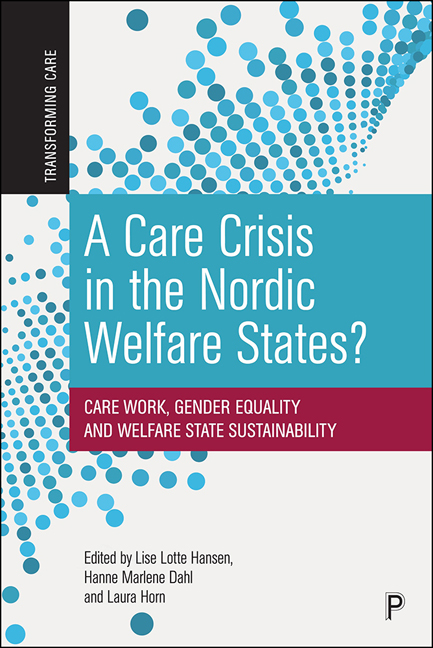 A Care Crisis in the Nordic Welfare States?
A Care Crisis in the Nordic Welfare States? Book contents
- Frontmatter
- Contents
- List of tables
- Notes on contributors
- Preface
- 1 Introduction: A care crisis in the Nordic welfare states?
- 2 The ‘care crisis’: its scientific framing and silences
- 3 Fraser’s care crisis theory meets the Nordic welfare societies
- 4 Crisis of care: a problem of economisation, of technologisation or of politics of care?
- 5 Deteriorating working conditions in elder care: an invisible crisis of care?
- 6 Managerialism as a failing response to the care crisis
- 7 ‘We are here for you’: the care crisis and the (un)learning of good nursing
- 8 Professionalisation of social pedagogues under managerial control: caring for children in a time of care crisis
- 9 Raising quality in Norwegian early childhood centres: (re)producing the care crisis?
- 10 Conclusion: Less caring and less gender-equal Nordic states
- 11 Postscript: A care crisis in the time of COVID-19
- Index
10 - Conclusion: Less caring and less gender-equal Nordic states
Published online by Cambridge University Press: 13 May 2022
- Frontmatter
- Contents
- List of tables
- Notes on contributors
- Preface
- 1 Introduction: A care crisis in the Nordic welfare states?
- 2 The ‘care crisis’: its scientific framing and silences
- 3 Fraser’s care crisis theory meets the Nordic welfare societies
- 4 Crisis of care: a problem of economisation, of technologisation or of politics of care?
- 5 Deteriorating working conditions in elder care: an invisible crisis of care?
- 6 Managerialism as a failing response to the care crisis
- 7 ‘We are here for you’: the care crisis and the (un)learning of good nursing
- 8 Professionalisation of social pedagogues under managerial control: caring for children in a time of care crisis
- 9 Raising quality in Norwegian early childhood centres: (re)producing the care crisis?
- 10 Conclusion: Less caring and less gender-equal Nordic states
- 11 Postscript: A care crisis in the time of COVID-19
- Index
Summary
This book began by asking whether it is justified to talk about the existence of a care crisis in the Nordic welfare states that have implemented neoliberal reforms and, if so, what are the characteristics of this crisis and the major areas of concern in terms of gender equality and welfare state sustainability? The book concludes that it is possible to talk about a care crisis in the Nordic welfare states, and that there are issues of concern regarding both gender equality and welfare state sustainability. It is an uneven crisis, which takes different forms in the various fields of care and in the different Nordic states. Although the care crisis might not be fully visible yet, it produces insufficient and inadequate care, sometimes poor working conditions and too little time for the care workers to care for themselves, their families and communities. However, the Nordic welfare states have also made a difference to the depth of the crisis: regulations and institutions have prevented the development of a full crisis. Moreover, care workers, care-givers and care-receivers and their organisations are taking part in social struggles against the consequences of neoliberalism and financialisation. Yet, the outcome has – so far – been less caring and less gender-equal Nordic states.
What is a care crisis?
In the introduction, we argued in favour of rethinking the notion of a care crisis. We defined a care crisis as characterised by inadequate resources for care and the absence of ‘good-enough care’, applying the theorisations of Hochschild (1995) and Fraser (2016) and combining them with the insights of Phillips (1994) considering the industries of care. In this book, the contributors have directed their attention to what happens inside the Nordic welfare state(s). Resources refer to money, time and the labour force: A care crisis is not exclusively constituted by recruitment problems, although these often occur as a symptom of a crisis of care.
Three of the chapters discuss in detail how the care crisis should be understood and which issues in particular should be highlighted. Dahl (Chapter 2) pointed out that the discourse(s) and conceptualisations of the care crisis in the international literature silence what constitutes good care, the complex identity of care-givers and care-receivers, and elder care (in opposition to childcare).
- Type
- Chapter
- Information
- A Care Crisis in the Nordic Welfare States?Care Work, Gender Equality and Welfare State Sustainability, pp. 176 - 189Publisher: Bristol University PressPrint publication year: 2021


